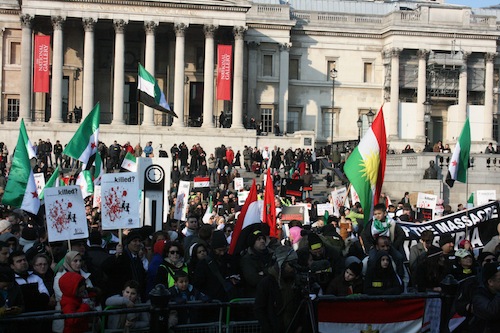Amnesty UK alienates Kurdish protesters during rally
Amnesty UK organised an Arab spring solidarity rally on Saturday the 11 of February. As stated on their website, they are a campaigning organisation for justice, fairness and freedom but, unfortunately as the event unfolded Kurdish people were alienated, marginalised and intimidated by protesters. The rally, although it was supposed to be for Arab and African uprisings did not have diverse speakers from post-revolution countries such as Yemen.
Kurdish activists and organizations were not invited to speak. Amnesty UK rally failed to highlight the plight of Kurdish Syrians who have suffered racism and state sanctioned discrimination by the Syrian regime. Despite this, the Kurdish Syrians who were among the audience wanted the Kurdish flag on the stage, alongside the Syrian flag to highlight Syria’s diverse multi-cultural society, but were prohibited. One Kurdish protester spoke to the managing campaigner, complaining that they were not represented and that it was ‘racist’. Kristyan Benedict from Amnesty International responded by calling security to which the Kurdish protesters responded with “There is no difference between the Saddam Hussein regime, Assad regime, and this organisation which censors Kurdish people from highlighting their grievances” as Benedict walked away.
Kurdish protesters left the rally early because they felt alienated and intimidated by the lack of acceptance within the Syrian community in Diaspora. In a short interview with Fazel Hawramy, the founder of Kurdish Blogger, he said, “Kurds are an important part of the Syrian society and the future of a peaceful Syria depends on their participation. Sidelining the Kurds won’t work and it is wrong. Amnesty International has been an important voice in defending the rights of the Kurds for many decades. The organization should make sure that the Kurds are represented in events such as this.”
Among those who attended the rally was Maryam Al Khawaja, Head of the Foreign Relations Office Bahrain Center for Human Rights, she was heckled during her speech and forced to digress when some Syrian protesters chanted “No to Iran, No to Hezbollah”. She told me, “The regime governments want people to think the uprising in Bahrain is Shia against Sunni, and the Syrian uprising is Sunni against Shia. This is the regime narrative, and we should not accept it”. She clarified that many of her friends were Syrians, who supported the Bahrain uprising, and that she had no ill feelings towards the Syrian protesters because of the actions of some hecklers.
In response to the allegations that Iran is funding Bahraini protesters, she simply said, “The government conducted a report, which they paid for, and found out that the Bahraini revolution has nothing to do with Iran. The Bahraini people don’t want any foreign intervention. The people in Bahrain are calling it a non-religious uprising”. Maryam explained the Bahraini government has consistently failed to provide evidence linking the protesters to Iran, and therefore the verbal assault by Syrian protesters at Trafalgar Square was misguided.
Amnesty UK did not just deprive Kurdish activists from having a platform at Trafalgar Square, but there were no Yemeni representatives present. In a short interview with Maryam Al-Kathiri, a student at SOAS said, “The event was misleading in its title because it only highlighted the injustices in Syria and Egypt” and she felt that Amnesty UK neglected the Yemeni uprising.
We hope future events organised by Amnesty UK, which is an internationally acknowledged organisation represents all ethnic groups without bias or prejudice.

Comments
Read this article, other FB-posts and your convo with Benedict on Twitter. Absolutely outrageous.